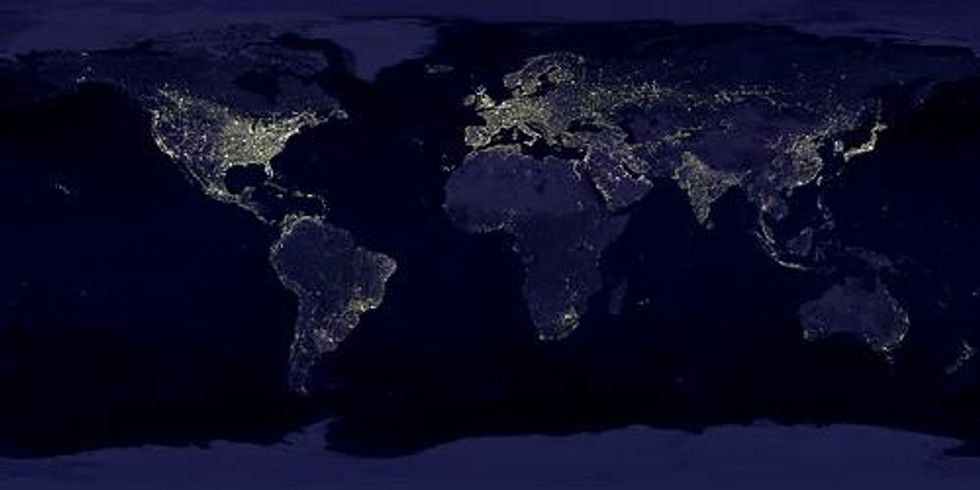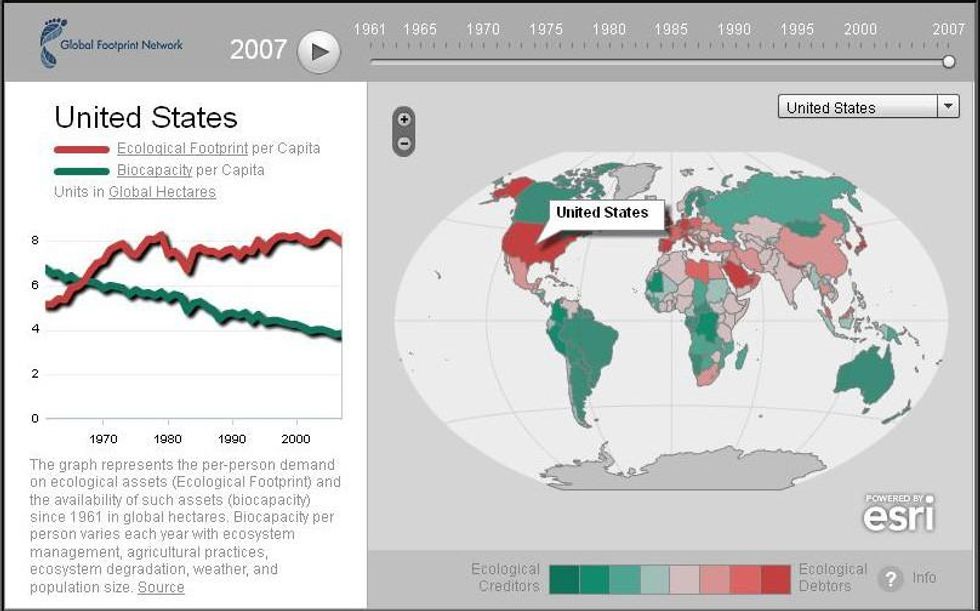

SUBSCRIBE TO OUR FREE NEWSLETTER
Daily news & progressive opinion—funded by the people, not the corporations—delivered straight to your inbox.
5
#000000
#FFFFFF
To donate by check, phone, or other method, see our More Ways to Give page.


Daily news & progressive opinion—funded by the people, not the corporations—delivered straight to your inbox.

"It is like having a bank account," Juan Carlos Morales of the independent think tank Global Footprint Network told Common Dreams. "If you don't have money available, you have to take out credit. We are depleting resources faster than Earth can regenerate."
The concept, originally developed by the New Economics Foundation and carried forward by the Global Footprint Network, reveals a disturbing trend. "Earth Overshoot Day," also called "Ecological Debt Day," is arriving earlier each year since it was first calculated in 1987, roughly three days earlier each year since 2011. Global Footprints says this trend is unequivocal since "Human consumption began outstripping what the planet could reproduce" in the mid-1970s.
"We are now operating in overdraft," reads a Global Footprints statement. "For the rest of the year, we will maintain our ecological deficit by drawing down local resource stocks and accumulating carbon dioxide in the atmosphere."
Global Footprints calculates the day of overdraft based on analysis of consumption and production patterns of each country. "Every scientific model used to account for human demand and nature's supply shows a consistent trend: We are well over budget, and that debt is compounding," reads an organizational statement. "It is an ecological debt, and the interest we are paying on that mounting debt--food shortages, soil erosion, and the build-up of CO2 in our atmosphere--comes with devastating human and monetary costs."
Not all countries borrow equally, with Europe, North America, and Qatar consuming at notably destructive paces. According to Global Footprints, if everyone in the world consumed on par with the United States, it would take four Earths to sustain the international population.
"Regardless of consumption patterns, it is still a global problem that affects everyone," explains Morales. "We all have responsibility to address it."

_____________________
Dear Common Dreams reader, The U.S. is on a fast track to authoritarianism like nothing I've ever seen. Meanwhile, corporate news outlets are utterly capitulating to Trump, twisting their coverage to avoid drawing his ire while lining up to stuff cash in his pockets. That's why I believe that Common Dreams is doing the best and most consequential reporting that we've ever done. Our small but mighty team is a progressive reporting powerhouse, covering the news every day that the corporate media never will. Our mission has always been simple: To inform. To inspire. And to ignite change for the common good. Now here's the key piece that I want all our readers to understand: None of this would be possible without your financial support. That's not just some fundraising cliche. It's the absolute and literal truth. We don't accept corporate advertising and never will. We don't have a paywall because we don't think people should be blocked from critical news based on their ability to pay. Everything we do is funded by the donations of readers like you. Will you donate now to help power the nonprofit, independent reporting of Common Dreams? Thank you for being a vital member of our community. Together, we can keep independent journalism alive when it’s needed most. - Craig Brown, Co-founder |

"It is like having a bank account," Juan Carlos Morales of the independent think tank Global Footprint Network told Common Dreams. "If you don't have money available, you have to take out credit. We are depleting resources faster than Earth can regenerate."
The concept, originally developed by the New Economics Foundation and carried forward by the Global Footprint Network, reveals a disturbing trend. "Earth Overshoot Day," also called "Ecological Debt Day," is arriving earlier each year since it was first calculated in 1987, roughly three days earlier each year since 2011. Global Footprints says this trend is unequivocal since "Human consumption began outstripping what the planet could reproduce" in the mid-1970s.
"We are now operating in overdraft," reads a Global Footprints statement. "For the rest of the year, we will maintain our ecological deficit by drawing down local resource stocks and accumulating carbon dioxide in the atmosphere."
Global Footprints calculates the day of overdraft based on analysis of consumption and production patterns of each country. "Every scientific model used to account for human demand and nature's supply shows a consistent trend: We are well over budget, and that debt is compounding," reads an organizational statement. "It is an ecological debt, and the interest we are paying on that mounting debt--food shortages, soil erosion, and the build-up of CO2 in our atmosphere--comes with devastating human and monetary costs."
Not all countries borrow equally, with Europe, North America, and Qatar consuming at notably destructive paces. According to Global Footprints, if everyone in the world consumed on par with the United States, it would take four Earths to sustain the international population.
"Regardless of consumption patterns, it is still a global problem that affects everyone," explains Morales. "We all have responsibility to address it."

_____________________

"It is like having a bank account," Juan Carlos Morales of the independent think tank Global Footprint Network told Common Dreams. "If you don't have money available, you have to take out credit. We are depleting resources faster than Earth can regenerate."
The concept, originally developed by the New Economics Foundation and carried forward by the Global Footprint Network, reveals a disturbing trend. "Earth Overshoot Day," also called "Ecological Debt Day," is arriving earlier each year since it was first calculated in 1987, roughly three days earlier each year since 2011. Global Footprints says this trend is unequivocal since "Human consumption began outstripping what the planet could reproduce" in the mid-1970s.
"We are now operating in overdraft," reads a Global Footprints statement. "For the rest of the year, we will maintain our ecological deficit by drawing down local resource stocks and accumulating carbon dioxide in the atmosphere."
Global Footprints calculates the day of overdraft based on analysis of consumption and production patterns of each country. "Every scientific model used to account for human demand and nature's supply shows a consistent trend: We are well over budget, and that debt is compounding," reads an organizational statement. "It is an ecological debt, and the interest we are paying on that mounting debt--food shortages, soil erosion, and the build-up of CO2 in our atmosphere--comes with devastating human and monetary costs."
Not all countries borrow equally, with Europe, North America, and Qatar consuming at notably destructive paces. According to Global Footprints, if everyone in the world consumed on par with the United States, it would take four Earths to sustain the international population.
"Regardless of consumption patterns, it is still a global problem that affects everyone," explains Morales. "We all have responsibility to address it."

_____________________